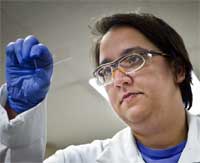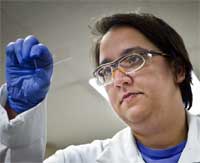 Rumford resident begins work at Canton vaccine manufacturer
Rumford resident begins work at Canton vaccine manufacturer
PROVIDENCE – May 16, 2011 – In today’s challenging economy, you wouldn’t expect anyone would need to seek guidance on how to politely turn down job offers and reject requests for job interviews, but that is exactly what Lori Darling needed.
A student in the University of Rhode Island’s Biotechnology Manufacturing program, Darling has job offers from five biotechnology companies – two of which are in Rhode Island — and has been invited to interview at half a dozen more. It’s an enviable situation to be in, said the Rumford resident.
“I had so many offers I didn’t know what to do,” Darling said. “It was a stressful situation, but a good kind of stress. Professor [Ed] Bozzi was helpful in telling me how to turn down the offers because I don’t want to burn any bridges for me or for the program.”
Darling had worked in the semiconductor industry for 14 years before being laid off, along with her husband, in 2009. She had always been interested in studying biological sciences, immunology and microbiology with the hope of working in the medical field, so when she heard about the URI program based at its Feinstein Providence campus, she immediately enrolled.
“I was looking for something that could take my interests and my life experience and put them together into one academic program. I couldn’t believe it was really going to happen,” said Darling. “I was a little terrified being 35 and not having been in school for 12 years, but the faculty and the lab manager were so supportive. It was a true learning experience.”
What Darling described as “biotech bootcamp” is an intensive bachelor’s degree program that requires a year of coursework in biology, chemistry, physiology, microbiology and laboratory sciences followed by a summer internship at a local biotech company. Most students enter the workforce after the first year and complete their degree as part-time students.
“There is a real camaraderie among the students, most of whom are older than the usual college student, and the people I met have become great friends,” she said. “Everybody works together. There’s no ‘us’ versus ‘them’.”
Darling credits the program’s focus on hands-on learning for her success in seeking full-time employment, as well as the industry contacts she developed with the many speakers who visited class.
“Every interviewer asked if I have experience in cell culturing and tangential flow filtration, and when I said yes, they were really impressed,” said Darling. “That’s what’s so special about the program. It’s not just academics; we’re learning the real techniques that we’re going to use in the industry.”
After thoughtful consideration, Darling decided to accept the job offer from Sanofi Pasteur, the vaccine division of Sanofi Aventis Group, the world’s largest vaccine company. She will work at the company’s Canton, Mass., facility where she will be working with live cells and live viruses to make vaccines for smallpox and Japanese encephalitis.
“I try hard not to look too far ahead,” Darling said. “I’m committed to continuing my education and advancing my career, but I don’t want to think about specializing in a specific area or a specific company. Life happens, and if you focus too hard on one goal, you may miss some opportunities in other areas. I want to continue my education and keep my eyes open for the next opportunity.”
Pictured above
Lori Darling. URI Department of Communications & Marketing photo by Michael Salerno Photography.

